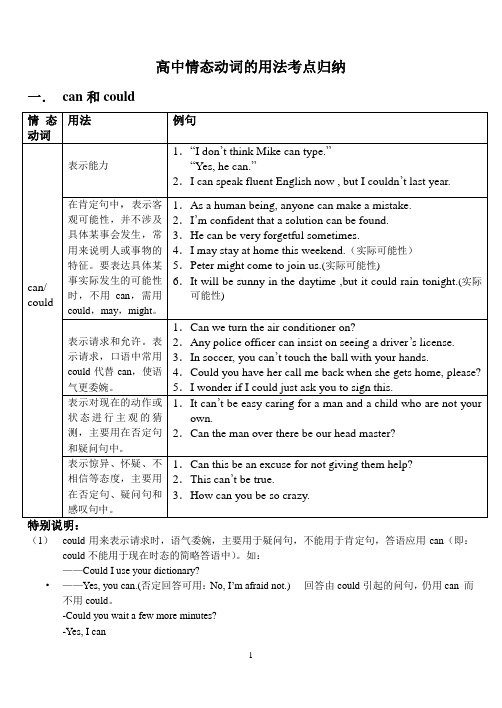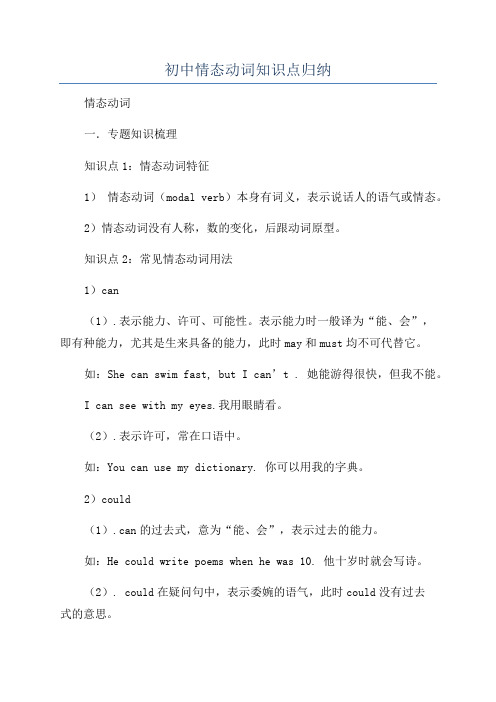情态动词复习经典句子背诵
- 格式:doc
- 大小:39.50 KB
- 文档页数:2


情态动词复习要点一、can/could和may/might表示“许可”1. 两者都可以表示许可,常可互换。
如:Can(May)I borrow your knife?我可以借你的刀子吗?The teacher says we can(may)leave early tomorrow. 老师说我们明天可以早一点走。
2.表示请求许可时,用could/might 比用can/ might更委婉。
但肯定回答时要用can或may。
---Could(Might)I stay in your office? 我可以呆在你的办公室吗?--- Of course, you can(may). 当然可以。
3. 表示“禁止,不允许”时用must not(mustn’t)。
You mustn’t climb the tree. It’s dangerous. 你不能爬树,那危险。
二、can, could和be able to表示“能力”1. 在现在时中can, be able to可互换。
如:I can(am able to) write some English words now. 我现在会写一些英语单词了。
2. be able to还可用于将来时和完成时。
如:He will be able to see you tomorrow.他明天去拜访你。
I have been able to go to work for a week. 我已经上班一周了。
3. 在过去时中,could表示泛指的能力,was/were able to表示过去特定的某一次能力。
如:She could swim when she was ten. 她十岁时就会游泳了。
Only thirty people in the building were able to escape after the fire broke out. 大火爆发后只有三十人从大楼里逃了出来。

高中情态动词的用法考点归纳一.can和could(1)could用来表示请求时,语气委婉,主要用于疑问句,不能用于肯定句,答语应用can(即:could不能用于现在时态的简略答语中)。
如:——Could I use your dictionary?•——Y es, you can.(否定回答可用:No, I’m afraid not.)回答由could引起的问句,仍用can 而不用could。
-Could you wait a few more minutes?-Y es, I can(2)can和be able to辨析can(could)和be able to都可以表示能力,意思上没有区别。
但can只有现在式和过去式,而be able to则有更多的形式。
如:I’ve always wanted to able to speak fluent English.Those bags look really heavy, are you sure you’ll be able to carry them on your own?但是,表示在过去某时的某一场合经过一番努力,终于做成了某事,通常不用could,而用was/were able to来表示。
这时,was/were able to相当于managed to do或succeed in doing。
如:After the accident it was a long time before she was able to walk again.The fire was very big, but most people were able to escape from the building.(3) 惯用形式“cannot …too…”表示“无论怎么……也不(过分)”。
如:Y ou cannot be too careful.你越小心越好。

初中情态动词知识点归纳情态动词一.专题知识梳理知识点1:情态动词特征1)情态动词(modal verb)本身有词义,表示说话人的语气或情态。
2)情态动词没有人称,数的变化,后跟动词原型。
知识点2:常见情态动词用法1)can(1).表示能力、许可、可能性。
表示能力时一般译为“能、会”,即有种能力,尤其是生来具备的能力,此时may和must均不可代替它。
如:She can swim fast, but I can’t . 她能游得很快,但我不能。
I can see with my eyes.我用眼睛看。
(2).表示许可,常在口语中。
如:You can use my dictionary. 你可以用我的字典。
2)could(1).can的过去式,意为“能、会”,表示过去的能力。
如:He could write poems when he was 10. 他十岁时就会写诗。
(2). could在疑问句中,表示委婉的语气,此时could没有过去式的意思。
如:Could you do me a favor?你能帮我个忙吗?—Could I use your pen? 我能用一下你的钢笔吗?—Yes, you can.可以。
(注意回答)3)must(1).must表示主观看法,意为“必须、一定”。
Must I hand in my homework right now? 我必须现在交作业吗?(2)其否定形式mustn’t表示“一定不要” “千万别” “禁止,不许”如:You mustn’t play with fire. 你不许玩火。
You mustn’t be late.你一定不要迟到。
(3)对must引导的疑问句,肯定回答为must,否定回答为needn’t 或don’t have to .如:—Must I finish my homework?我现在必须完成作业吗?—No, you needn’t.不,你不必。

概念引入 情态动词有具体的词义,但也同助动词一样,需要与其他词语一起构成句子的谓语,另外情态动词没有人称和数的变化,情态动词后必须跟动词原形。
欣赏含有情态动词的名言: A man can do no more than he can. 凡事量力而行。
A good marksman may miss. 好射手也有失手的时候。
Life is fine and enjoyable,yet you must learn how to enjoy fine life. 生活是美好的,但要学会如何享受美好的生活。
The brighter you are,the more you have to learn. 越聪明的人,越需要学习。
Books and friends should be few but good. 书与友,贵精不贵多。
用法讲解1. can的用法: 1)表示能力、许可、可能性。
表示能力时一般译为“能、会”,即具有种能力,尤其是生来具备的能力。
She can swim fast, but I can’t. 她能游得很快,但我不能。
I can see with my eyes. 我用眼睛看。
2)表示许可,常在口语中。
You can use my dictionary. 你可以用我的字典。
3)表示推测,意为“可能”,常用于否定句和疑问句中,此时can’t 意为“不可能”。
Can the news be true? 这个消息会是真的吗? —Can it be our teacher? 那个人有可能是我们老师吗? —No, it can’t be our teacher. He is on a visit to the Great Wall. 不可能。
咱们老师正在游览长城呢。
2. could的用法: 1)could是can的过去式,意为“能、 会”,表示过去的能力。
He could write poems when he was 10. 他十岁时就会写诗。

情态动词的用法归纳及顺口溜
情态动词有can (could), may (might), must, have to, shall (should, will (would), dare (dared), need (needed), ought to 等。
情态动词无人称和数的变化,
不能单独使用。
1 英语情态动词用法顺口溜情态动词要记牢;动词原形来跟梢。
不管人称单复数;现在过去乐逍遥。
can 表能力和许可;也许可能may 来表;
必须一定must;should 应该来报到。
英语情态动词用法顺口溜
回答不须needn’t;mustn’t 为不必要。
否定只要接not;疑问赶紧往前跑。
1 情态动词的基本用法有哪些一、can, could
1) 表示能力(体力、知识、技能)。
Can you lift this heavy box?(体力)
Mary can speak three languages.(知识)
Can you skate?(技能)
此时可用be able to 代替。
Can 只有一般现在时和一般过去式;而be able to 则有更多的时态。
I’ll not be able to come this afternoon.
当表示“经过努力才得以做成功某事”时应用be able to,不能用Can。
如:He was able to go to the party yesterday evening in spite of the heavy rain.。
情态动词Modal verbs情态动词表示说话人对某一动作或状态的态度,认为可能、应当、必要等等,情态动词没有人称和数的变化。
1.can 和could (could 是can 的过去式。
)(1) . 表示“能力”、“许可”、“可能性”(用于疑问句或否定句中) 。
Can she drive a bus? Can it be trueThe teacher can't be in the office.?(2). could 可以用来比较委婉地提出问题。
Could you help me with my English ?(3) can 和be able to 意思上没有区别.was / were able to do=succeeded in doing sth. 表示过去成功做成某事.A fire happened to the hotel last night but luckily everyone was able to get out.2.may 和might (might 是may 的过去式。
)(1) 表示允许或征询对方许可,有可以"的意思。
否定式may not,也可用must not = mustn '但常用mustn't 来表示“不可以”、“禁止”、“不允许”等意思。
May I watch TV after supper? Yes, you may.No, you may not (mustn't) .在请求对方许可时,Might I…更礼貌一些。
Might I have your name ?(2) 表示可能性, “或许”、“可能”(用在肯定句中)。
Might 表示语气更加不肯定。
He may / might come today .3.must 和have to(1) 表示“必须”、“应该”。
否定式must not (mustn '表示不许可” 不准” 禁止"等。
情态动词必考点归纳1.表请求和允许:can/may;could/might (could和might)也可表委婉客气,此时答语应用原形----Could I use your computer ?----Yes,you can.(I’m afraid not)若答No(Sorry),you can’t.则不婉转。
2. 表推测:肯定must/may/might; 疑问can/could ;否定can’t(不可能)may not(可能不)Children can be very tiring.3.反问句:He may know the play,doesn’t he?You must have studied English before,didn’t you?You can’t have been caught in the rain,were you?4.could/ be able tocould表具有某能力were/was able to不仅有某能力而且已成功做成某事,相当于managed to do 或succeeded in doingThe fire spread through the hotel very quickly but everyone was able to(managed to)escape/succeeded in escaping.The new student could follow the teacher well.5. may(might) as well 还是...好;不妨 You might as well tell me the truth.6. must/have to:We must do everything step by step./We have to consider the whole thing.注意:mustn’t(禁止/不许可)决不能,一定不能;don’t have to不必;must偏要(做令人不快的事)Must you shout so loudly?7.shall1)征求对方意见或请示对方,用于一、三人称When shall my father be able to leave hospital?Shall we sit here?2)命令、警告、允诺、威胁及决心 You shall go with me.(命令)/You shall have the book when I finish it.(允诺)/You shall be punished.(威胁)/You’ll be sorry for what you did.(威胁)/Nothing shall stop me from doing it.(决心)8. should 1)表劝告或建议,“应该”,“按理应当”They should be there by now,I think./Mr. Black should /ought to get home by now.2)表“万一” Ask Tom to ring me up if you should see him./Should I be free tomorrow,I’ll come.3)表不解或惊异或“竟然”之意Why should you invite him./How should you be so careless?/It seems so unfair that this should happen to me.9.will/would1)表意志/意愿:If you will listen to me,I’ll give you some advice./I promised that I would offer you some help.2)表习惯性或客观规律:“总是”“惯于”Fish will die without water./Every evening,she would sit by the window,deep in thought.3)表“能”或“行”The machine won’t work./The door won’t open.4)表预料或猜测:It would be about ten when he left.10.would do/used to do:前者不可用来表状态,如;There would be/used to be a hospital there.(F)We used to swim in that river when young.(现已不)/We would swim in that river when young.(现在不一定) 11.dare/need:need—need to do—don’t need to do—Do...need to do...?----行为need do—needn’t do---Need...do?否定、疑问—--情态We need to start early./You don’t need to do it yourself./you needn’t do it yourself./(Why)Need he go today?注意:need/want/require doing =...to be doneDare:作情态动词时用于否定,疑问(及表疑问的从句)和条件句dare to do---dare not to do----Do...dare to do...?----行为;dare not do—Dare...do...?---情态Few Ss dare to challenge the rules./Nobody dares to challenge the rules./Anybody dares to challenge the rules?Dare she go out alone at nigh t?/She dare not say what she thinks./I’ll support you if you dare do it.112.must have done—He must have known the secret./must be doing—He must be working in the garden. can’t/couldn’t have done—He can’t/couldn’t have finished it in so short a time.ca n’t be doing 不可能在做... He can’t be working in the garden.can’t/couldn’t have been doing不可能一直在做...They can’t /couldn’t have been working in the garden.could have done本来能够而没做We could have finished the project on time.should (not)/ought(not)to have done:We ought to/should have given you more help,but we were too busy.might/may (not)have done: He may/might (not) have knowns the secret.needn’t have done: She need not have come yesterday./She didn’t need to come yesterday.一、用合适的情态动词或“情态动词+所给词的适当形式”填空1.I should have been there, but I ________ find the time.2.Helen ________ go on the trip with us, but she isn't quite sure yet.3.Tom, you ________ not leave all your clothes on the floor like this!4.You can't imagine that a well-behaved gentleman ________ be so rude to a lady.5.It has been announced that candidates ________ remain in their seats until all the papers have been collected.6.—Lucy doesn't mind lending you her dictionary.—She ________.I've already borrowed one.7.John, look at the time.________ you play the piano at such a late hour?8.—________ this book be yours?—No, it ________ be mine.It ________ be Tom's.He is looking for his book.9.As a girl, she ________ get up at six every day.10. ________ he to clean the classroom after school?11.You ________ be tired after the long trip, aren't you?12.—What's the name?—Khulaifi.________ I spell that for you?13.You ____________ (see) the film, haven't you?14.You ____________ (talk) on the phone at that time, for I couldn't get through.15.They ____________ (miss) the plane, or perhaps they have been prevented from coming for some reasons.16.____________ you pass the College Entrance Examination!17.He had known the matter before you told him, so you ____________ (not tell) it to him.18.I did not call to make any airline reservation but I ____________.19.The light is out.They ____________ (not work) now.20.—My cat is really fat.—You ____________ (not give) her so much food.21.____________ such a woman be loved by so good a man?22.You ____________ smoke here.The sign says “No smoking”.23.You are in uniform.You must be a policeman, ____________ you?24.No matter how heavy the rain was, she ____________ give up attending his lecture.25.It ____________ sound funny, but it is true.26.He announced that he ____________ walk home.And soon he disappeared.27.You naughty boy! You ____________ get what you deserve.28.At that time they thought the story ____________ be true.29.You ____________ get the book as soon as I have read it.30.There's a lot of noise from the bedroom.It ____________ John.He ____________ (dance).T ell him to stop.1.couldn't2.may3.must/should4.should 5.shall 6.needn't7.Must8.Can; can't; must 9.would10.Ought11.must12.Shall 13.must have seen14.must be talking 15.might have missed16.May17.needn't have told18.should have19.can't be working20.shouldn't have given21.Can22.mustn't23.aren't24.would not25.may/might26.would27.shall28.might29.shall30.must be; must be dancing2。
情态动词口诀顺口溜以下是一个关于情态动词的口诀顺口溜:情态动词很重要,用法需要记心上。
Can 表能力或请求,Could 过去也能用。
May 表许可或可能,Might 委婉语气柔。
Must 必须或肯定,Shall 一三人称建议。
Should 应该或竟然,Will 将来或意愿。
Would 过去将来时,虚拟语气也常用。
记清意思和用法,情态动词不发愁。
以下是一个关于情态动词的口诀顺口溜,希望对你有所帮助:情态动词有 can、could、may、might、must、shall、should、will、would,用法需记牢。
can 表能力,could 表过去,may 表许可,might 表委婉。
must 表必须,shall 用于一三人称表建议,should 表应该,will 表将来,would 表过去将来。
记清意思和用法,情态动词不再难。
除了上面提到的用法,情态动词还有以下几种常见用法:1. 表示推测:情态动词可以表示对过去、现在或将来的推测。
例如:- He must be at home.(他一定在家。
)- She may come tomorrow.(她可能明天来。
)- They could have finished the work.(他们可能已经完成了工作。
)2. 表示虚拟语气:在虚拟语气中,情态动词表示与事实相反的情况。
例如:- If I were you, I would study harder.(如果我是你,我会更努力学习。
)- He could have passed the exam if he had studied harder.(如果他学习更努力,他本来可以通过考试的。
)3. 表示习惯或倾向:情态动词可以表示习惯或倾向。
例如:- He often goes to the gym.(他经常去健身房。
)- She will sit in the front row.(她会坐在前排。
情态动词---小菜一碟
can/could
1.can 表示现在的能力could 过去的能力
Some of us can use the computer now, but we could n’t ten years ago.
2.can/could都可以表示许可或征询对方许可,后者更委婉
---Can/ Could I borrow your bike for a moment? --- Yes, you can.(答句只能用can)3.can表有时会
He can be a very tiresome child at times.
It can be pretty cold here, even in spring.
may/ might
1.may表示许可,
You may go now.
may/ might征询对方许可(只用于第一人称)
---May/ Might I go with my friends to the harvest festival?
---Yes, you may. / No, you mustn’t. / No, you may not. / No, you’d better not.
2.表示可能性
He may/ might be from Canada.
They may/ might have a lot of work to do.
3.may表祝愿
May you be happy.
May you have a long and happy life.
4.We might/may as well have another talk with him. 还不如,不妨
Her appearance has changed so much that you may well not recognize her. 非常可能
must
1.The work must be finished as soon as possible. 必须
2.You mustn’t smoke in public places. mustn’t 表禁止
3.There must be something wrong. 表推测
4.---can I smoke? --- If you must. 偏要
---Who is the girl standing over there? ---Well, if you mus t know, her name is Mabel. 偏要shall
1.一三人称疑问句中征求对方意见
Where shall I wait for you?
Shall we go out for a meal tonight?
Shall those goods be sent over to you at once?
When shall he come to see you?
2.二三人称陈述句中表示允诺、警告、威胁、命令、决心等
---will you read me a story, Mummy?
---OK. You shall have one if you go to bed as soon as possible. 允诺
---Excuse me, but I want to use your computer to type a report.
--- You shall not have my computer if you don’t take care of it. 警告
You shall do it at once! 命令
Candidates shall remain in their seats until all the papers have been collected. 命令
3. 用于法律条文、规章制度规定
---What does the sign over there read?
--- No person shall smoke or carry a lighted cigarette, cigar or pipe in this area.
One of our rules is that every student shall wear school uniform while at school.
should
1.表示劝告、责任、义务(可以和ought to 互换)
You should/ ought to keep your promise.
Young people should/ ought to respect old people.
2.表示不出意外按理应该
---When can I come for the photos? --- They should be ready by noon.
---Tom, when can you be back? --- Mum, I should be back in ten minutes.
will
1.---will you marry him? --- I will. 意愿
He won’t go with us. 意愿
2. I will never be back again. 意志
3. I am going to the library. Will you go with me? 询问对方意愿(只用于第二人称)
Will you give him a message when you see him? 向对方提出请求(只用于第二人称)would
1.过去的意愿、意志
Days later, my brother called to say he was all right, but would not say where he was. 2.表示意愿或请求,语气比will委婉
Would you like to join the football club?
I’d like to take a look at that shirt over there.
3.过去常常
He would go swimming in summer when he worked in the countryside.。